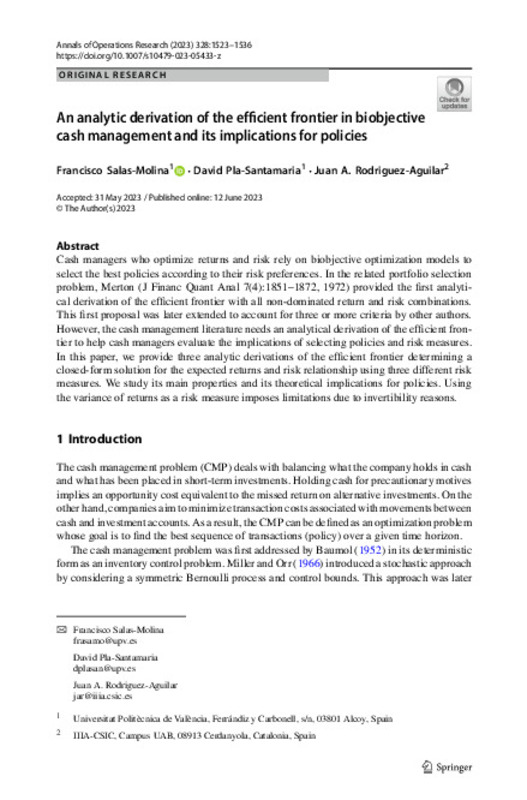Baumol, W. J. (1952). The transactions demand for cash: An inventory theoretic approach. The Quarterly Journal of Economics, 66(4), 545–556.
Constantinides, G. M., & Richard, S. F. (1978). Existence of optimal simple policies for discounted-cost inventory and cash management in continuous time. Operations Research, 26(4), 620–636.
da Costa Moraes, M. B., Nagano, M. S., Sobreiro, V. A., et al. (2015). Stochastic cash flow management models: A literature review since the 1980s. In P. Guarnieri (Ed.), Decision Models in Engineering and Management (pp. 11–28). Berlin: Springer.
[+]
Baumol, W. J. (1952). The transactions demand for cash: An inventory theoretic approach. The Quarterly Journal of Economics, 66(4), 545–556.
Constantinides, G. M., & Richard, S. F. (1978). Existence of optimal simple policies for discounted-cost inventory and cash management in continuous time. Operations Research, 26(4), 620–636.
da Costa Moraes, M. B., Nagano, M. S., Sobreiro, V. A., et al. (2015). Stochastic cash flow management models: A literature review since the 1980s. In P. Guarnieri (Ed.), Decision Models in Engineering and Management (pp. 11–28). Berlin: Springer.
Markowitz, H. (1952). The Portfolio selection. Journal of Finance, 7(1), 77–91.
Merton, R. C. (1972). An analytic derivation of the efficient portfolio frontier. Journal of Financial and Quantitative Analysis, 7(4), 1851–1872.
Miller, M. H., & Orr, D. (1966). A model of the demand for money by firms. The Quarterly Journal of Economics, 80(3), 413–435.
Qi, Y. (2020). Parametrically computing efficient frontiers of portfolio selection and reporting and utilizing the piecewise-segment structure. Journal of the Operational Research Society, 71(10), 1675–1690.
Qi, Y. (2022). Classifying the minimum-variance surface of multiple-objective portfolio selection for capital asset pricing models. Annals of Operations Research, 311(2), 1203–1227.
Qi, Y., & Li, X. (2020). On imposing ESG constraints of portfolio selection for sustainable investment and comparing the efficient frontiers in the weight space. SAGE Open, 10(4), 1–17.
Qi, Y., & Steuer, R. E. (2020). On the analytical derivation of efficient sets in quad-and-higher criterion portfolio selection. Annals of Operations Research, 293(2), 521–538.
Qi, Y., Steuer, R. E., & Wimmer, M. (2017). An analytical derivation of the efficient surface in portfolio selection with three criteria. Annals of Operations Research, 251(1–2), 161–177.
Salas-Molina, F. (2019). Selecting the best risk measure in multiobjective cash management. International Transactions in Operational Research, 26(3), 929–945.
Salas-Molina, F. (2020). Risk-sensitive control of cash management systems. Operational Research, 20(2), 1159–1176.
Salas-Molina, F., Pla-Santamaria, D., & Rodríguez-Aguilar, J. A. (2018). Empowering cash managers through compromise programming. In H. Masri, B. Perez-Gladish, & C. Zopounidis (Eds.), Financial decision aid using multiple criteria (pp. 149–173). Berlin: Springer.
Salas-Molina, F., Pla-Santamaria, D., & Rodriguez-Aguilar, J. A. (2018). A multi-objective approach to the cash management problem. Annals of Operations Research, 267(1), 515–529.
Salas-Molina, F., Rodriguez-Aguilar, J. A., & Díaz-García, P. (2018). Selecting cash management models from a multiobjective perspective. Annals of Operations Research, 261(1), 275–288.
Salas-Molina, F., Rodriguez-Aguilar, J. A., Pla-Santamaria, D., & García-Bernabeu, A. (2021). On the formal foundations of cash management systems. Operational Research, 21(2), 1081–1095.
Salas-Molina, F., Rodríguez-Aguilar, J. A., & Guillen, M. (2023). A multidimensional review of the cash management problem. Financial Innovation, 9(67), 1–35.
Savage, L. J. (1951). The theory of statistical decision. Journal of the American Statistical Association, 46(253), 55–67.
Schroeder, P., & Kacem, I. (2019). Optimal cash management with uncertain, interrelated and bounded demands. Computers & Industrial Engineering, 133, 195–206.
Schroeder, P., & Kacem, I. (2020). Competitive difference analysis of the cash management problem with uncertain demands. European Journal of Operational Research, 283(3), 1183–1192.
[-]









